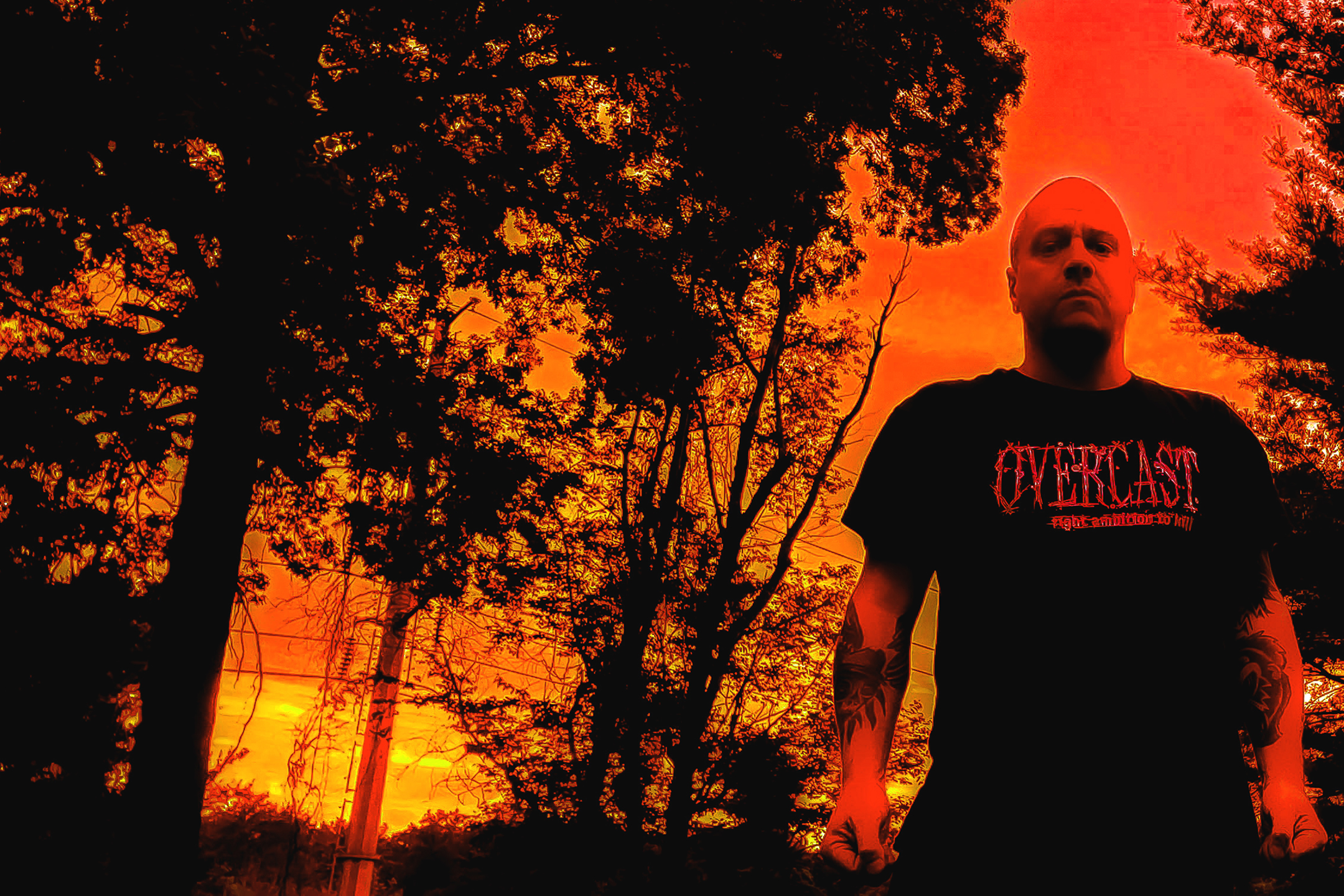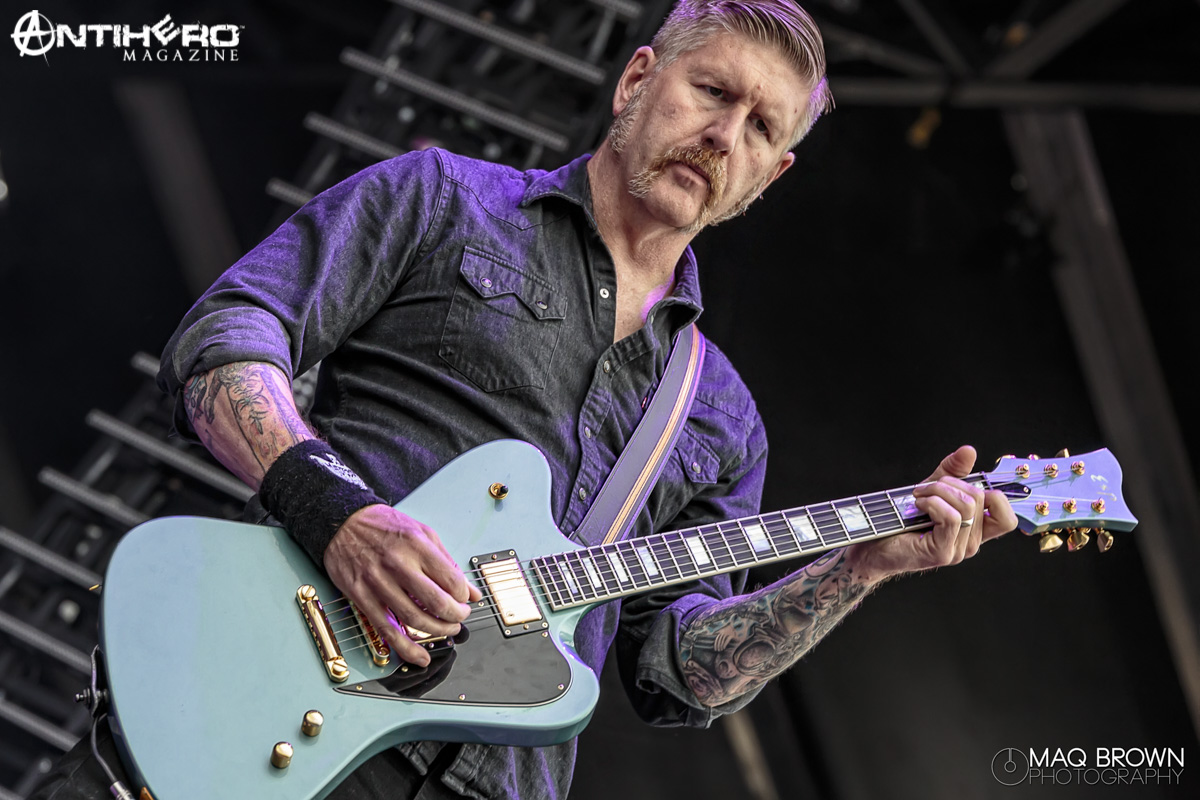ANTIHERO: “Shards In The Wire” is a solo effort devoid of outside collaborators. How did this approach influence the creative process and outcomes compared to your previous collaborator-rich projects?
GRIDFAILURE: When I wrote the bio/info for this record I included that line, “the frequently collaborator-strewn endeavor void of any outside contributors,” which may be somewhat misleading in the fact that I have release an array of completely solo albums/EPs since the inception of Gridfailure in 2016. I’ve just been doing a ton of collaborating in recent years. Gridfailure began as a solo project, and my first album, Ensuring The Bloodline Ends Here, was a fully solo effort, and the first record I ever actually engineered and recorded myself. Since then I’ve released over three-dozen titles through Bandcamp, some fully collaborative albums with other artists (Megalophobe, Walking Bombs, Interstitia, Mac Gollehon, Rack, and others), split releases (Chrome Waves, Feel Happiness, Never Presence Forever, S.C.R.A.M.), solo releases (Ensuring The Bloodline Ends Here, Scathed, Powerdementia, Irritum, Epicenter MMXX: Quarantine Instrumentals, Perpendicular To The Living Ones, and now Shards In The Wire), and more.
Some of the albums have one or two random collaborators throughout them, and some have many outside contributors. My ongoing five-album Sixth Mass-Extinction Skulduggery concept series has a massive array of contributors. Live, Gridfailure takes on a totally improvisational approach. I’ll gather a few trusted, brave collaborators to join me and we simply improvise an entire set. We turn out the lights, set up a projector, and simply play off of each other in a mangled/aggressive free-jam attack. I’ve even done solo live performances. Some of these have been released as live improv albums on my Bandcamp page and are viewable on my YouTube page.
The vision and overall work of Gridfailure is my personal solo venture, but I really love collaborating with an intensely diverse spread of artists from all over the map both literally and musically.
ANTIHERO: The EP is described as having a sonic foundation in post-industrial beats, unconventional percussion, and layers of harsh noise. Can you elaborate on the techniques and instruments you used to achieve this distinctive sound palette?
GRIDFAILURE: I suppose Gridfailure has a “core sound” that comes naturally from my layered harsh vocal style, downtuned bass, elements of noise and nature/field recordings, and so on, but I don’t really set out to have a set approach or sound. Some of the records have had a more depressive/sad tone while others are much more volatile or aggressive. I’m constantly experimenting with a wide range of instruments; bass and vocals are my primary go-to elements, but I am always learning more about keys/synths, playing guitar, attempting to play drums or create beats on drum machines, and so on. It’s an ever-evolving experiment.
For Shards In The Wire, I focused more on slow to mid-paced post-industrial rhythms, bass, guitar, keys, vocals, and harsh noise/horror elements to keep it in a bit of a more themed sound. There are some xylophones, percussive elements created with immersive/underwater contact mics, a grip of chains and broken metal objects, percussion on a large metal pipe, digital and analog drum machines, and more at play. I incorporate many types of effects pedals to create massive reverb, heavy low-end, monstrous distortion, repeating delays and loops, and so on. Vocally, I usually stack the vocals several times with varying effects on each layer. So, while I don’t consider the project a full-on noise project, there’s definitely a large influence of power electronics, harsh noise, dark ambient, and other fringe styles and sounds infused into the mix.
ANTIHERO: Thematically, the EP touches on dejection, loss, and sociopathic ire for humanity. Was there a particular event or series of events that inspired this thematic direction?
GRIDFAILURE: Most of my lyrics, titles, and themes bear some overall duality. While on the surface a song may be written about a tectonic plate shift or some sort of devastating physical act of nature, the lyrics may also be mirroring mental anguish; a tear in one’s mental stability, referenced through said natural disaster. I’m wholly disgusted with humanity’s destructive ways of consuming and abusing our planet, politically we’re on the verge of another World War, and the majority of humankind is more concerned with their TikTok followers than helping prevent the planet from boiling us alive. Sure, like everybody else, I’ve been through personal anguish and pain and some of that bleeds into the lyrics, but it’s more for the few folks who listen to my music and explore the lyrics to interpret for themselves.
ANTIHERO: In your previous work, you’ve often infused elements of nature into your music. Are there any specific field recordings or natural soundscapes included in “Shards In The Wire,” and how do they contribute to the EP’s atmosphere?
GRIDFAILURE: I can’t think of an album or release where I didn’t infuse some elements of rain/thunderstorms, fire, wind, bodies of water, urban background noise, samples from construction/destruction, and so on. I think of Gridfailure’s output as more of an immersive experience than songs; abstractions and earworms rather than infectious hooks and choruses. Therefore, natural elements give something folks can attach to or understand within the murk of the deconstructed music and so on. I’ve recorded some performance elements actually in the rain during dangerous storms (most notably throughout the ongoing Sixth Mass-Extinction Skulduggery series), and I’m constantly carrying a small digital recorder or pulling audio elements from video footage I shoot out in the world. On this record specifically, there are elements of wind and other natural elements in “Panic Azimuth” which I used in an attempt to create a dizzying, lost in the wilderness feel. There are several instances of rain/storms on the album. You can hear a flock of migrating birds retreating when the rumbles of “Upheaval Of The Foundation” come in.
ANTIHERO: “Shards In The Wire” seems to maintain a thematic cohesion that’s been a hallmark of GRIDFAILURE’s work. How do you maintain such thematic integrity across varied sonic explorations?
GRIDFAILURE: That’s an interesting point. I suppose this stems from the “core sound” I referenced earlier, as I create, record, and produce 95% of these records here at my place, The Compound. I rarely record at outside studios and I use a lot of similar instrumentation and approaches in creating these recordings, although things are always shifting and expanding. I am always working on multiple records at once as well, so I’m not always just in a singular headspace. I record everything at home, so if I’m in the mood to play bass or experiment with a new effects setup while I’m working heavily on one specific record, and the sounds don’t work out with that release, I may move the recordings over to a different project and work them into that one later. Once enough of these recordings in a certain sound or headspace amass in a specific folder, I realize I have the foundation of a new record happening there, and I begin putting more of a focus into honing that sound or theme. With this record, and some other recent recordings, I wanted to have very pronounced beats in place, while a lot of the albums have more buried rhythms or percussion. There are a few short bridge tracks on this record without any discernible rhythms or vocals (“Corpse Refurbishment” and “I Lure Dig Far,” the latter of which is just the letters of Gridfailure rearranged), but songs like “Upheaval Of The Foundation,” “There Never Was An Aaron,” and “Shards In The Wire” each have simplistic but pronounced mid-paced beats.
ANTIHERO: The track “There Never Was An Aaron” is inspired by the film “Primal Fear.” Can you discuss the process of translating cinematic inspiration into an auditory experience?
GRIDFAILURE: The song is not necessarily an homage to the movie itself or my interpretation of the film (although I think the plot twist at the end of the movie is one of the best in cinematic history; up there with The Usual Suspects, Fight Club, Se7en, The Game, The Sixth Sense, Psycho). My inspiration to name the song this way comes down to those previously discussed elements of duality. For the entire movie you’re watching what we believe is an alternate personality to blame for multiple murders, in what it appears is an existential unwinding unfolding through a high-tension court case and a captivating mental study, and when Edward Norton’s character reveals the truth in the final scene it’s simply a savage, manipulative shift in everything you’ve been lead to believe for the entire film. My lyrics aren’t in any way written from the perspective of anybody in the film; it’s more about being in that position of finding out somebody you trusted has horribly misled and deceived you; like the air gets sucked out of the room and you enter a sort of mental paralysis when you hear or discover this buried truth. Resentment, regret, vengeance, inescapable grief, embarrassment, and confusion flooding your senses simultaneously.
ANTIHERO: With “Shards In The Wire” positioned between other releases like “Sunyata Ontology” and upcoming titles for 2024, how does it serve as a bridge or transition in GRIDFAILURE’s body of work?
GRIDFAILURE: No, my releases don’t really come out in any actual progression or cohesive transition. I’m used to releasing more like four records per year; I’ve released six titles in a year. Sunyata Ontology is a fully collaborative album with electronic/ambient/EDM soloist Interstitia, which we worked on from sometime in 2019 through most of the pandemic, and that finally came out earlier this year; that’s basically a super harsh techno album. And I was ready to release Sixth Mass-Extinction Skulduggery III through Nefarious Industries this Fall, but there are a lot of parts to that one (physical product, a box set, and more) that were not ready in time to hit a November release date, so we moved that to early 2024, and I immediately pulled these partial songs out of the closet and finished them off so I could independently release them as Shards In The Wire right away while SMES III is finalized. That album has songs that lean more black metal, electronic/techno, jazz, world music, classical, and more. Every now and then there’s a specific date secured for a release that I may have coming out with a label, but otherwise I just finish records as I have the time and they are released as they’re completed.
ANTIHERO: GRIDFAILURE’s output is described as dense and tension-filled, with a wide array of influences. As you continue to evolve, which of these elements do you find yourself gravitating towards more, and why?
GRIDFAILURE: I’m not sure if I am gravitating towards any singular influence more than another with Gridfailure. I think I am just further exploring most of the genres I listen to, of which there are many, so the possibilities are perhaps endless. Rather than gravitating in any one musical direction, I’m just refining how to envision, create, and capture these sounds, so it’s more like boiling the water and filler out of what I do and making a more concentrated syrup of so many of these genres and styles that I try to explore. I am constantly expanding my video work and incorporating other forms of art into the project which also opens up an unreal amount of possibilities.
Musically, stylistically it’s just all over the place. I have a full album of “harsh Americana” halfway completed, with so much material it may become two records. The final two albums in the five-album Sixth Mass-Extinction Skulduggery concept series, Teeth Collection and Drought Stick, are at least halfway completed and are some of the oldest Gridfailure material to date – largely recorded in 2016 and 2017, likely to come out over the next two years after SMES III is out – and those are very atavistic/post-apocalyptic, tribal, acoustic. My first of several fully audio/visual records with Pornohelmut is being completed for release in the first half of 2024 as well. I’m working on more collaborative material with Mac Gollehon which is all heavily more in the experimental jazz vein, a collaborative dark ambient/heavy industrial album with Tovarish underway, a collaborative album with the mastermind of black/death metal acts Valdur and Sxuperion underway. I’m working on my fourth collaborative album with Megalophobe, every one of which has had a completely different sound than the others.
My new band Diminishing, which is Lane Oliver from Yatsu and myself, is another dark ambient/noise/experimental act but it is moving in other directions further from the Gridfailure sound as well. I also have a new hardcore/punk project underway and collaborate with all sorts of other bands that sound nothing alike; in the past year I’ve appeared on records from Walking Bombs, Thetan, Mac Gollehon, and others. My old early-mid 90s high school streetpunk band sort of reunited long distance during the pandemic with ideas of reforming in an alternate format and sound. So, I think some of these other outlets will absorb some of these influences and directions, and maybe Gridfailure will concentrate on a few genre types more than others for a few years, but I really don’t think about it like that. I just create, release, and continue the process. Paranoia/downfall/revenge/repeat.







